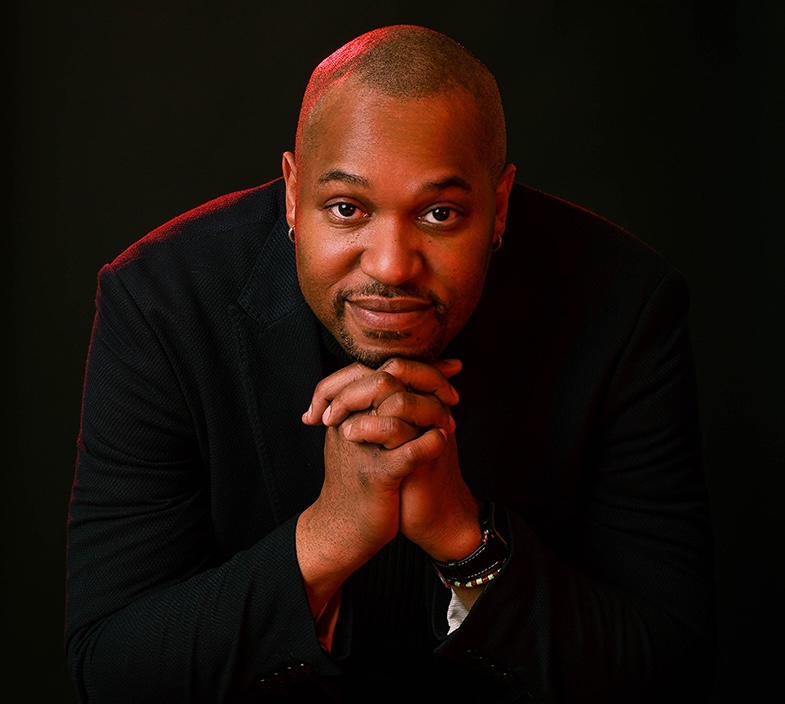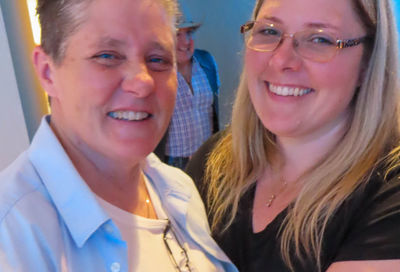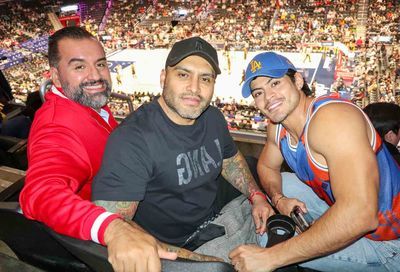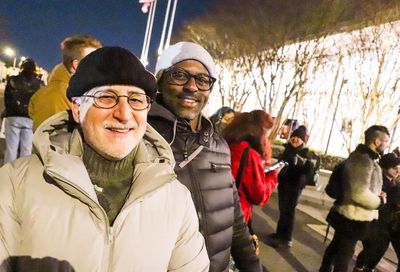Top of the Hill
At 35, Nob Hill is Washington, DC's oldest black gay bar
Nob Hill has been around for 35 years. Robert Jones has owned it for the past 14. It’s a perfect match.
 |
The Cozy Corner.
The New Yorker.
The Brass Rail.
In the African-American gay community, these are but a few of the local drinking establishments that have had their moments of popularity, not to mention notoriety.
But one bar has outlasted them all. Nob Hill. Which is still thriving after 35 years.
According to the Rainbow History Project, Nob Hill “is the oldest continuously operating gay bar in the city, and one of the oldest black gay bars in the country.” It opened its doors to the public in 1957 at 11th and Kenyon Streets, but reportedly operated as a private social club for gay men from 1953 to 1957. The bar changed ownership several times over the years, but its mission to serve the black gay community has remained a constant.
Robert Jones has been associated with the bar since 1980 — first as a bartender, later as proprietor. At 48, the photo-shy Jones retains his youthful good looks, and boasts a barkeep’s smile, broad, beaming, welcoming. When he laughs, it’s a hearty, room-filling affair, and when he speaks of his bar, which is receiving the Local Business of the Year Award at this weekend’s annual Black Lesbian & Gay Pride Day, he does so with the kind of affection typically reserved for one’s life passion.
A native of Springfield, Massachusetts, Jones landed in Washington during a twenty-three year stint with the Coast Guard. But he was inexorably drawn to the gay nightlife — and yearned to become a greater sum of its part.
“I love being a bartender,” says Jones, who can still be found pouring drinks at Nob Hill on any given night.
Though it’s a fairly large space, occupying two full floors, with room enough for a Wednesday through Sunday show filled with drag queens and dancing boys, Nob Hill retains a serene, homespun intimacy. Occupying a corner berth in a largely residential community, Nob Hill doesn’t call attention to itself, and like any good neighborhood bar, it is unobtrusively incorporated into the environment.
And yet, it is so much more than a neighborhood bar. It is a place of congregation, a place where the familiarity breeds friendship, a place that Washington’s black gay community calls home.
METRO WEEKLY: Tell me a little about the history of Nob Hill, including the claim that it is, if not the oldest, one of the oldest gay bars in the country.
ROBERT JONES: As far as being the oldest bar, no one’s proved otherwise. It opened in 1957 and nobody has ever said, “We opened before then.” So in that sense nobody’s disputed it. It was within walking distance of Howard University, so when it opened, it became known as the kind of place that younger guys would go to meet older men. And it is in a residential area and that’s what made it a neighborhood bar. It opened long before the school across the street. I guess nowadays if that had been reversed, Nob Hill would have never been able to open. It was grandfathered in.
MW: In the Fifties, of course, there weren’t official gay bars.
JONES: No. And from what I’ve heard, back in the Fifties and Sixties patrons couldn’t walk around with drinks. The drinks had to be brought to you. So you had a lot of table service. But you get more of a quaint restaurant appearance and everything.
 |
MW: When did it become a more openly gay establishment?
JONES: Probably in the early seventies. One of the things that’s real interesting is that up until the late Eighties they had “Gospel Hour.” Every Sunday night they featured different groups from different churches who would come in and sing gospel. That was one of Nob Hill’s biggest draws.
MW: The groups didn’t mind singing in a gay bar?
JONES: I imagine that was an issue with some people, but I think the bigger issue was that you were doing it in a bar instead of a church. And I’m pretty sure certain churches wouldn’t participate because it was in a bar, period. I used to hear little complaints, like, “How can you do this in a bar?”
MW: When did the drag shows begin?
JONES: Not until the mid-Eighties. As I recall, Adrian Blackwell, the mother of the house, did one as a benefit to raise money for a coworker she worked with down at the Brass Rail. It continued from there — and as time went on, the shows started incorporating male dancers. And that’s where we’re at today.
MW: Let’s talk about your personal experience with Nob Hill.
JONES: I had been going there [as a patron] for six months. I told the owners I was interested in working there. It took them another five or six months before I was asked to work there. But what I did to help me get a job at Nob Hill, believe it or not, was go to bartending school. Now, for a neighborhood bar, you really don’t need to go to bartending school — you make highballs. And I’d bartended before, but I just thought that would help me get a job.
MW: What were you doing prior to working at Nob Hill?
JONES: I was military.
MW: Were you active at the time?
JONES: Yes. In the Coast Guard. Twenty-three years.
MW: Was the military a good experience for you?
JONES: Oh, yeah. I enjoyed the Coast Guard. They didn’t do anything to piss me off. [Laughs.]
MW: How did you get to the point where you bought the bar?
JONES: I’d been going there for about nine years, and I remember saying to the owners, “I’d like to be part of the ownership.” Back then, as today, you had to have a manager’s license in order to be behind the bar without an owner. My manager’s license was getting ready to expire — the bar owner has to sign the application. I submitted my application to get signed and they never gave it back. And finally, as the deadline was getting closer, I went to one of the owners and said, “My manager’s license is getting ready to expire. What are we gonna do?” And he said, “I thought you knew that owners don’t need a manager’s license.” And that’s how I found out they were going to let me buy into the bar.
Eventually, the other partners wanted to go off and do other things, but I was interested in staying. So I went out and found new partners and we bought them out. There were four of us then — it’s since dwindled down to two of us.
MW: What have you brought to the bar as its owner?
JONES: The one thing I’ve always taken the opportunity to do is provide as much personal service as I possibly could. That was really our niche, besides having male dancers. [Laughs.] Nowadays, I think what people look for is good service. And so I think if you can remember the little particulars of how a person likes their drink, how they want it served, it helps build loyalty.
MW: You didn’t leave the Coast Guard until 1996, so you were in effect leading a double career. A gay man who owns a gay bar in a community is a pretty visible occupation.
JONES: I think maybe in the beginning I did think about that, but as time went on, it never even entered my mind that “You’re in the Coast Guard, you shouldn’t be owning a bar.” I thought of Nob Hill as a legal place of employment. It wasn’t like I was hiding. I worked there. Of course, I didn’t go down to the Coast Guard and tell them I was working at Nob Hill.
MW: How has the neighborhood changed over the years with regard to its acceptance of Nob Hill?
JONES: The neighborhood before was more accepting. The neighbors didn’t mind. More and more neighbors are probably minding us now because the demographics are changing. Some of the people who have bought homes in the area are just shocked that there’s a bar across the street.
MW: How do you avoid problems?
JONES: You have to listen and be really respectful. We work out our differences. We entertain what our neighbors have to say, because I think if I was living in the neighborhood, I’d want somebody to listen to me.
MW: What issues have you had to deal with?
JONES: One of the big issues, of course, is closing time. You have a bunch of people coming out on the street at the same time, which is fine as long as they just keep on moving. It’s when they want to congregate that you have problems. So we have to make sure everyone leaves quietly.
I’ve been very fortunate in the fact that the people in the neighborhood haven’t asked me to do anything that’s unreasonable. One of the advantages to having been there a long time is that a lot of people know who I am, so there’s somebody there that you can complain to, so to speak.
 |
MW: What distinguishes Nob Hill from some of the others in the city — such as The Fireplace and Bachelor’s Mill — that also cater to a primarily black clientele?
JONES: We’re black owned and operated and the others aren’t. And that’s the thing that’s very different. I have to leave it at that. [Laughs.]
MW: I take it you have strong opinions on this subject?
JONES: Very much so. Very much so.
MW: Some gay bars are mixed, some much less so. Can you talk about the need for bars that cater to a specific group?
JONES: I think there’s a time for mixing, and there’s a time I think that you want to have your own like kind with you, and that’s all you want. I also think that with any group, you have an underlying bond because there are certain things you already naturally understand — whether it be some little catchphrase or something that everyone experienced as a kid. It’s like any group of people coming from anyplace because they have similar backgrounds: you’re able to relate, and you start off with the relationship right away, just like that.
MW: I imagine there’s also a comfort level, particularly with a neighborhood establishment such as Nob Hill.
JONES: I think there’s still a market for neighborhood bars. I think everybody likes going to warehouse bars, but every now and then I think neighborhood bars do offer a certain kind of comfort level. Maybe you don’t know the patron next to you, but you’ve seen them enough, so it makes you feel comfortable around them. Which is completely different from being in a big warehouse type bar. Some people want to have this huge house, other people want to have something nice and quaint.
MW: Are there any misconceptions surrounding Nob Hill?
JONES: That it’s a bar that just caters to older men — it has the reputation of being, as some people call it, “The Wrinkle Room.” They’re completely wrong. We don’t have the young twenties crowd, but I’d say about thirty is the average age in there. You’d be amazed with the shows — young and old both like seeing the shows, and as late as the shows go, it’s not the older ones who are staying out late.
I’ll talk to a lot of people who don’t want to come to Nob Hill because they say, “Oh, there’s nothing up there but old people.” But they’d be surprised. Still, that’s hard to fight — to get rid of the notion that it’s a Wrinkle Room type thing, and that younger people are up there.
MW: Do you foresee yourself doing this well into the future?
JONES: Yes. As long as I can continue to bartend. I still like the business.
MW: Finally, how does it make you feel that you’re getting Local Business of the Year award at this weekend’s Black Lesbian & Gay Pride?
JONES: Proud. Very proud. There are couple things that I feel really, really proud of — the simple fact that there are a lot of gay bars that have come and gone for Nob Hill to have stayed open this long, I think, is something to be proud of all by itself. Even since the seventies all the way up until now, there’s been a number of bars — Cozy Corner, Foxy Lounge, The New Yorker, Brass Rail, Kenyon Street Grill — that all catered to black gays and are not with us anymore for whatever reason. Because the bar business can be cutthroat.
MW: What’s your secret?
JONES: In the bar business you just have to know what your niche is. I can’t compete with the disco bars, these big warehouse bars. I can’t compete with that. I can compete with somebody who can give you a neighborhood-type atmosphere, someone who’ll give you good service, somebody who will make you feel special, who will remember what you drink. That’s my niche. I know I can compete with anyone like that.
MW: As a gay African-American man, what gives you pride? And I want the answer from Robert’s heart.
JONES: From Robert’s heart? What gives me real pride is watching black people on the whole progress. That has always given me pride. It always, always will give me pride. And I think that’s the direction black pride is going into as well — it’s a weekend event that I feel real proud that I’m a part of. We do things that are really constructive, and I think that we’re finally giving back to the community, and that gives me an awful lot of pride — we’re doing something beneficial with our time, with our energy, and with the funds that we generate.
This year’s Black Lesbian & Gay Pride Day Festival takes place on Sunday, May 25, at the new Washington Convention Center, from noon to 7 p.m. Admission is $10. There are several events throughout the weekend (including several parties — see our Nightlife listings on page 59 for official events at the Edge/Wet and at Nation). For more information on the weekend’s parties, various events and Saturday’s Cultural Arts and Wellness festivals, visit www.dcblackpride.org or stop by the official Black Pride Hospitality Suite in the Renaissance Hotel at 999 9th Street NW.
Support Metro Weekly’s Journalism
These are challenging times for news organizations. And yet it’s crucial we stay active and provide vital resources and information to both our local readers and the world. So won’t you please take a moment and consider supporting Metro Weekly with a membership? For as little as $5 a month, you can help ensure Metro Weekly magazine and MetroWeekly.com remain free, viable resources as we provide the best, most diverse, culturally-resonant LGBTQ coverage in both the D.C. region and around the world. Memberships come with exclusive perks and discounts, your own personal digital delivery of each week’s magazine (and an archive), access to our Member's Lounge when it launches this fall, and exclusive members-only items like Metro Weekly Membership Mugs and Tote Bags! Check out all our membership levels here and please join us today!
























